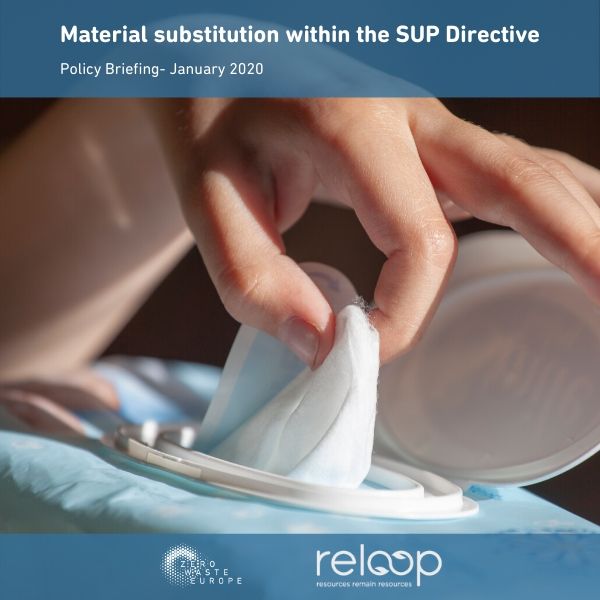Press Release: Loopholes in the SUP Directive The current material substitution strategy could defeat the very purpose of the directive

FOR IMMEDIATE RELEASE: Brussels, 22nd January 2020
In July 2019 the SUP Directive, which aims to reduce the impacts of single-use plastics on the environment and to foster a transition away from single-use plastics, entered into force and now the focus is on the implementing Acts and Guidelines. The proper interpretation of the Directive is crucial, starting by getting the scope right to avoid any loopholes.
Yesterday during an event held in Brussels, Zero Waste Europe (ZWE) and Reloop Platform presented a new study conducted by Eunomia Research & Consulting What is plastic? A study exploring the potential for certain materials to be considered as exempt from the Single Use Plastics Directive, with particular focus on man-made cellulosic fibres, on the definition of plastics, exemptions to the Directive and a series of loopholes and material substitutions which could significantly undermine its goal.
The Eunomia study, analysing the case of wet wipes as they offer a good example of potential substitution with alternative materials (lyocell and viscose), focuses on polymers covered, or not, by the term ‘plastic’.
Exempting materials with similar environmental impacts from the Directive’s scope, could incentivise manufacturers to opt for material substitutions which would absolve them from having to finance the cost of litter clean-up, transport and treatment, and the cost of awareness-raising activities.
Alongside the study, a joint Policy Briefing signed by ZWE and Reloop was published with the intent to provide the European Commission with clear recommendations on the implementation phase: Material substitution within the SUP Directive.
Both publications stress the importance of the ongoing discussions around the definition of plastic in determining which single-use products fall within the scope of regulation because depending on the interpretation, some SUP items will be excluded.
At the end of the day, if such material substitution happens in the conditions stated above, the impact of the SUP legislation would be substantially reduced and could even backfire in environmental terms.
In order to avoid material substitution and obtain a real impact on the economy and the environment in the Circular Economy Action Plan, the Commission should implement an approach to products and waste that is not only material specific but also system oriented. This is only possible by going beyond the impacts of just single-use plastic to include all single-use products, and creating a legislative framework for reuse operations that provides for an organised transition from single use applications towards durable, efficient systems.
Commented Joan Marc Simon, Executive Director, Zero Waste Europe.
It is also imperative that member states introduce in national law, a precautionary approach to the exemption of materials or products considered not to be single-use plastic, with a high burden of proof to be applied.
Added Clarissa Morawski, CEO and cofounder, Reloop Platform
ENDS
Notes
Press Contacts:
Joan Marc Simon, Executive Director, Zero Waste Europe
[email protected] +32 (0) 2736 2091
Agnese Marcon, Communications Coordinator, Zero Waste Europe
[email protected] +32 (0) 456 078 038
Clarissa Morawski, Chief Executive Office, Reloop Platform
[email protected] +34 (0) 636 70 80 95